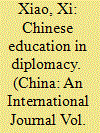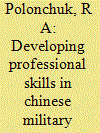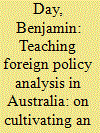| Srl | Item |
| 1 |
ID:
112842


|
|
|
|
|
| Publication |
2012.
|
| Summary/Abstract |
This article reflects upon contemporary education in Chinese diplomacy covering three aspects: curriculum contents, teaching methods and teaching goals. It argues that the curriculum contents have the following shortcomings: poor awareness of the real problems in China's diplomatic practices, lack of global awareness that is consistent with China's image as a great country, blurring of the boundaries between academic and policy systems, oversight of practices and lack of good understanding of ancient, early modern and contemporary Chinese diplomacy and lack of adequate training in research methodologies. Teaching methods are problematic as the continued dependence on traditional historical research methods has failed to recognise the usefulness of theoretical analytic tools. Also, the value of case studies has not been fully recognised and utilised. With regard to teaching goals, Chinese diplomatic teaching desperately needs some vitality. This article makes recommendations for improving Chinese education in diplomacy, such as applying psychology in diplomatic education, offering a course on comparative diplomacy, developing a course on diplomacy theory, emphasising diplomatic history and improving the training in social sciences research methodologies.
|
|
|
|
|
|
|
|
|
|
|
|
|
|
|
|
| 2 |
ID:
164232


|
|
|
|
|
| Summary/Abstract |
This paper looks at the components of professional competence in a military translator. It explores the role of Chinese military idioms in the shaping of structural components of military translators' professional skills in the course of teaching the Chinese language at a military university. It also examines the main organizational and teaching conditions for developing professional skills in Chinese military translation by means of military idioms.
|
|
|
|
|
|
|
|
|
|
|
|
|
|
|
|
| 3 |
ID:
134140


|
|
|
|
|
| Publication |
2014.
|
| Summary/Abstract |
The author tells us how the Islamic Institute of Tajikistan (until 2007, the Tajik Islamic University) was set up and is developing; he follows the far-from-easy road the official religious education system has covered as part of the process of Islamic revival that began as soon as the country became independent. He also looks at the moving forces and stages of the development of the official higher religious education system in Tajikistan, the key figures involved, and the problems caused by the remnants of the Soviet anti-religious past.
He identifies the main problems-lack of qualified teachers and textbooks-as well as the main obstacle, viz. defects of management and organization of the teaching process and funding, as well as clashes between the traditional and modern principles and methods for teaching religious disciplines.
Much attention is paid to the role of the state in developing official religious education as part of Tajikistan's education system.
The author traces the stages that finally brought the Islamic Institute of Tajikistan under the patronage of the state, a process that transformed the non-state religious educational establishment into a state educational institution.
|
|
|
|
|
|
|
|
|
|
|
|
|
|
|
|
| 4 |
ID:
170410


|
|
|
|
|
| Summary/Abstract |
The United States-centric nature of the Foreign Policy Analysis (FPA) subfield poses a range of pedagogical challenges, especially when the subject is taught outside North America. The preponderance of FPA literature written by US scholars and examining US cases can frustrate non-US students, who often wish to study decisions they consider more directly relevant to their own region and experience. I this piece, I reflect on how I have grappled with this tension in teaching a postgraduate FPA course at the Australian National University. I discuss my choice to prioritise cultivating an ‘FPA disposition’ among students and how, as a means of doing so, I chose to design a curriculum based on a semester-long case study examining the US decision to invade Iraq in 2003. While this pedagogical approach may initially seem contradictory to my long-term aim of contributing to the expansion of FPA beyond North America, it reflects my conviction that instilling an ‘FPA disposition’ in the next generation of graduate students is essential to growing and enriching the subfield in the long term.
|
|
|
|
|
|
|
|
|
|
|
|
|
|
|
|